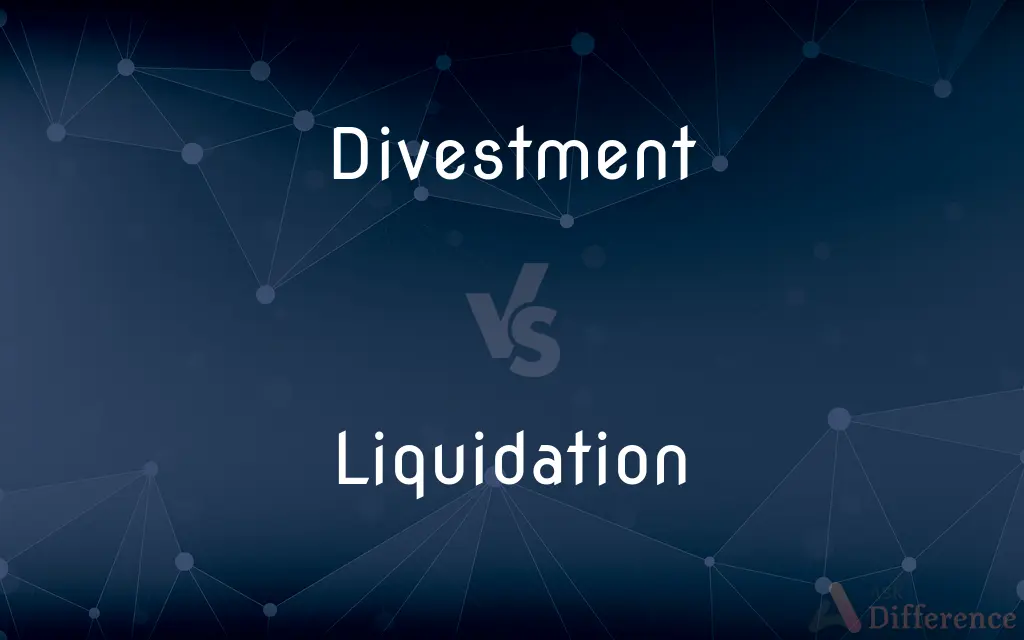Divestment vs. Liquidation — What's the Difference?
By Tayyaba Rehman — Updated on November 3, 2023
Divestment is the process of selling off subsidiary business interests or investments, while liquidation is the process of dissolving a company by selling its assets.

Difference Between Divestment and Liquidation
Table of Contents
ADVERTISEMENT
Key Differences
Divestment is a strategic business decision involving the sale or disposal of significant company assets or divisions. Liquidation signifies the end of a business through the sale of its assets to pay off debts.
Divestment may occur to focus on core operations, reduce debt, or change corporate strategy. Liquidation happens when a business is insolvent and must satisfy creditors through the sale of its assets.
While divestment is a choice for a company looking to optimize, liquidation is a necessity when a company is in financial distress. Divestment can lead to reinvestment in more profitable areas, but liquidation marks the cessation of business operations.
The process of divestment allows a company to retain control over how and when assets are sold. Liquidation, especially in bankruptcy, can involve a court or appointed liquidator taking control of asset dispersion.
Divestment is part of a company's growth or downsizing strategy and is often undertaken voluntarily. In contrast, liquidation is a last resort when a company cannot meet its financial obligations and must disband.
ADVERTISEMENT
Comparison Chart
Purpose
To streamline operations or raise capital.
To pay off debts due to insolvency.
Control
Usually remains with the company.
Can be transferred to a liquidator.
Outcome
Can lead to reinvestment and growth.
Results in the dissolution of the company.
Volition
Strategic choice by the company.
Forced by financial circumstances.
Process
Can be partial or complete, selective.
Generally involves complete sell-off of all assets.
Compare with Definitions
Divestment
The sale of an asset or division.
The company announced the divestment of its manufacturing sector.
Liquidation
Converting assets to cash.
The company went into liquidation and sold all its assets.
Divestment
To strip or deprive of certain assets.
The divestment of their overseas holdings took a year to complete.
Liquidation
The act of settling debts by selling property.
Liquidation of the estate was necessary to pay the creditors.
Divestment
Withdrawing investment for ethical reasons.
They pursued divestment from companies involved in fossil fuels.
Liquidation
The process of winding up a business.
After years of losses, liquidation was the final step.
Divestment
A reduction in capital assets to reallocate resources.
Divestment from non-core businesses boosted the firm's stock.
Liquidation
Closing a business through asset sales.
The liquidation sale attracted bargain hunters from all over.
Divestment
The act of divesting interest in a venture.
Divestment can be a strategic move to avoid antitrust issues.
Liquidation
Terminating a company's operations.
The board voted for liquidation after declaring bankruptcy.
Divestment
In finance and economics, divestment or divestiture is the reduction of some kind of asset for financial, ethical, or political objectives or sale of an existing business by a firm. A divestment is the opposite of an investment.
Liquidation
Liquidation is the process in accounting by which a company is brought to an end in Canada, United Kingdom, United States, Ireland, Australia, New Zealand, and Italy, and many other countries. The assets and property of the company are redistributed.
Divestment
To strip, as of clothes.
Liquidation
The process of liquidating a business
The company went into liquidation
Divestment
To deprive, as of rights or property; dispossess.
Liquidation
The killing of someone, typically by violent means.
Divestment
To free of; rid
"Most secretive of men, let him at last divest himself of secrets, both his and ours" (Brendan Gill).
Liquidation
To pay off (a debt, claim, or obligation); settle.
Divestment
To sell off or otherwise dispose of (a subsidiary company or an investment).
Liquidation
To settle the affairs of (a business firm, for example) by determining the liabilities and applying the assets to their discharge.
Divestment
(Law) To devest.
Liquidation
To convert (assets) into cash.
Divestment
(finance) The sale or other disposal of some kind of asset.
The fossil fuel divestment movement is calling on institutions to divest from the companies causing climate change.
Liquidation
To eliminate, especially by killing.
Divestment
The act of divesting.
Liquidation
To settle a debt, claim, or obligation.
Liquidation
To settle the affairs of a business or estate by disposing of its assets and liabilities.
Liquidation
The act of exchange of an asset of lesser liquidity with a more liquid one, such as cash.
Liquidation
The selling of the assets of a business as part of the process of dissolving the business.
The store is having a liquidation sale: everything must go as they go out of business.
Liquidation
(euphemism) Murder of dehumanized victims.
Liquidation
The act or process of liquidating; the state of being liquidated.
Liquidation
Termination of a business operation by using its assets to discharge its liabilities
Liquidation
The act of exterminating
Liquidation
The murder of a competitor
Common Curiosities
Is liquidation always due to bankruptcy?
Often, but not always; liquidation can also be a choice to close a business.
Does divestment affect company size?
Typically, it reduces the size and scope of the company's operations.
What does liquidation mean?
Liquidation is the process of converting a company’s assets to cash to pay off debts.
What is divestment?
Divestment is selling off parts of a company, such as a division or investment.
What happens to employees during liquidation?
They may be laid off if the company is dissolving completely.
Can divestment be a positive action?
Yes, if it's to focus on core areas or get rid of unprofitable parts.
Are shareholders affected by liquidation?
Yes, they may lose their investment if debts exceed asset values.
Can a company recover from divestment?
Yes, divestment can be a strategic choice to improve a company's financial health.
Who conducts the liquidation of a company?
It can be managed by company directors or a court-appointed liquidator.
What is the difference between divestment and selling?
Divestment is the larger strategy, selling is the act within that strategy.
Do companies always divest to avoid loss?
Not always; divestment can also be for ethical reasons or regulatory compliance.
What's a liquidation sale?
It's when a company sells its assets to the public, often at discounted prices.
What's voluntary liquidation?
It's when a solvent company decides to cease operations and liquidate assets.
Can a division be liquidated instead of the whole company?
Yes, parts of a company can undergo liquidation without dissolving the entire entity.
Can divestment lead to liquidation?
It’s not the typical outcome, as divestment is often a means to avoid liquidation.
Share Your Discovery

Previous Comparison
State vs. Explain
Next Comparison
Behalf vs. BehaveAuthor Spotlight
Written by
Tayyaba RehmanTayyaba Rehman is a distinguished writer, currently serving as a primary contributor to askdifference.com. As a researcher in semantics and etymology, Tayyaba's passion for the complexity of languages and their distinctions has found a perfect home on the platform. Tayyaba delves into the intricacies of language, distinguishing between commonly confused words and phrases, thereby providing clarity for readers worldwide.














































